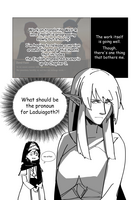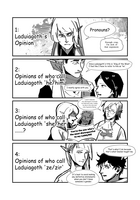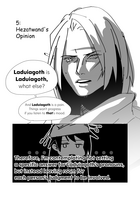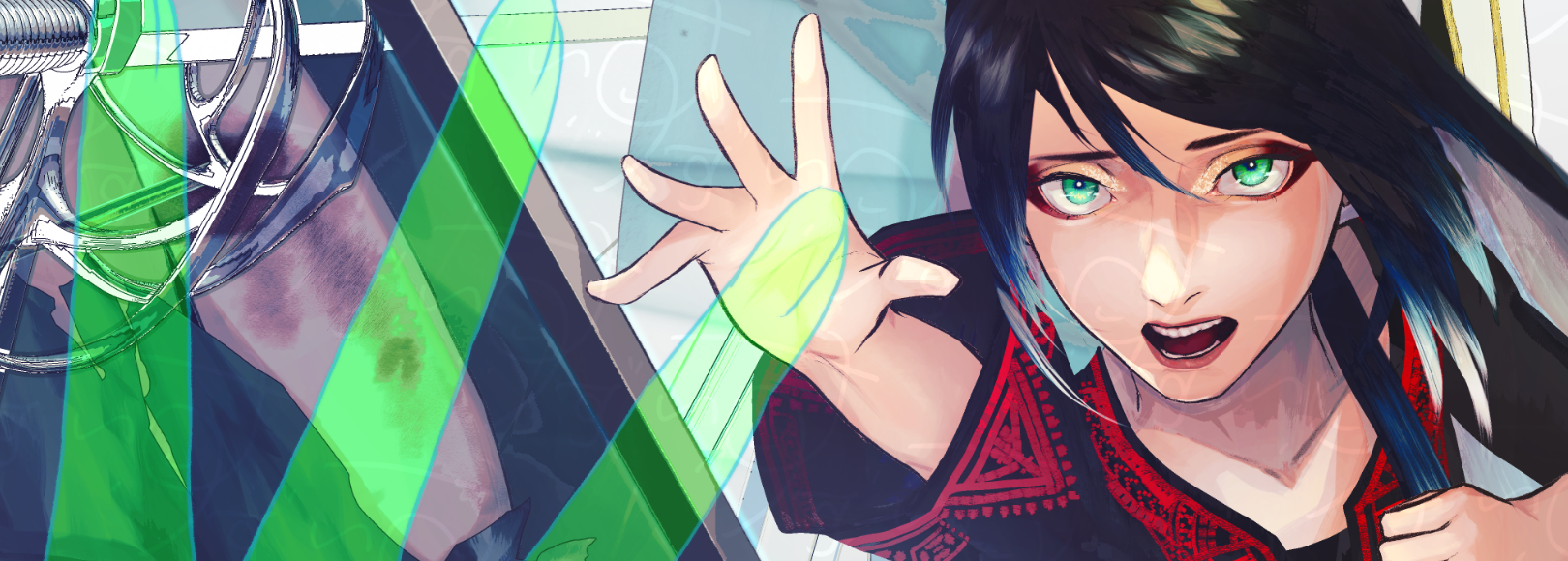The thorny problem of "personal pronouns and gender", etc



***この記事の日本語版はPixivFanboxに掲載されています***
Characters that changed slightly during the English translation
When I was writing the scenario for the game "Witch Of Yelekedis (hereinafter referred to as WoY-R)," I had in mind "someday releasing an English version." So I tried to write it in Japanese that would be easy to translate into English.
When writing the script, I kept the following points in mind:
- Sentences that were written with a strong focus on the 5W1H, especially "Who".
- Japanese sentences that were not dependent on Japanese context.
- Japanese idioms, Yojijukugo, and words derived from Chinese historical stories were eliminated as much as possible.
In addition, in the narration, which is written in the first person from Ranjarma's point of view, I tried to emphasize objectivity as much as possible and keep her subjectivity to a minimum.
So the translation work itself is surprisingly easy and smooth. There are few lines that require free translation, so I just need to translate literally. There may be some lines that are too literal and leave the reader confused... but I would appreciate it if you could point out such points.
That's why I finished the English translation up to Chapter 3 in less than a month.
In the process of translating, I actually changed parts of the Japanese scenario as well. When I looked over the scenario again while translating it, there were a few parts that made me wonder. So, changes were made to a few parts.
The three main changes are as follows:
- Tone of conversation between Zizval and Deelan
- Frhoidhanath's lines
- Content of conversation between Gezulzence and Shilegizand
Tone of conversation between Zizval and Deelan
In previous versions, if you set a certain flag, you could see Zizval and Deelan engaging in an Argy-bargy like "a rebellious teenage boy vs. an overly involved working older sister". I changed the content of this event. It has changed a lot!
I think the new version shows Zizval's somewhat down-hearted side, and Deelan's tendency to be too serious and throw too many unnecessary balls.
Frhoidhanath's lines
Although the general outline remains the same, there are many subtle changes. There are some lines that I felt were unnecessary and were cut.
The general outline remains the same, but I think the impression of him will be different between the Japanese version and the English version.
In the Japanese version, he treats Ranjarma like a kid. If you put it in human terms, it's like, "Wow, she's only 10 years old, but she's a very smart girl." That's the impression he has of Ranjarma.
So what he says in the Japanese version is quite simple. You can see from his choice of words that he clearly treats Ranjarma like a kid.
In the English version, he still treats Ranjarma like a kid, but he talks about things that are a little more in-depth. If the Japanese version treats Ranjarma like a 10-year-old, then the English version seems to see Ranjarma as about 13 or 14 years old. Or maybe about 12?
That and his partiality towards Laduiagoth. In fact, the Japanese and English versions have different directions of expression. Both are disgusting, but it seems like each person will have a different opinion on which one is more disgusting.
Content of conversation between Gezulzence and Shilegizand
The conversation between these two and Ranjarma has been rewritten quite a bit. The important parts that have relevance to the story are left as they are, but the less important parts, i.e. the joking conversations, have been rewritten quite a bit.
Additionally, there are some big differences between the Japanese and English versions. It's not really something worth mentioning, and it's a completely unimportant point, but the things Gezulzence and Shilegizand say are completely different in the Japanese and English versions. The Japanese version focuses on Shilegizand, while the English version focuses on Gezulzence.
It's possible to switch languages even in the middle of the story, so if you're interested, give it a try.
The thorny problem of "personal pronouns and gender"
The English translation process went smoothly, but that doesn't mean there weren't any problems. The personal pronouns of each character, especially Laduiagoth, were the most difficult part of the translation.
In Japanese, "personal pronouns" are not a big problem. The strength of the Japanese language is that it allows a wide range of freedom to attach certain attributes or gender to words, or to remove them altogether.
However, in English, personal pronouns can be a source of trouble.
When referring to someone, should we call them "he," "she," "they," or should we use another word? — To be honest, as a Japanese person and a non-binary (or agender), I find this issue bothersome and incomprehensible.
From a Japanese speaker's perspective, I think "She, he, they, oh so troublesome. Why don't they just call them by their names?" But English is mysterious, and for some reason it seems to stubbornly insist on using personal pronouns.
Laduiagoth is a hermaphrodite, and is close to being non-binary. In that case, it seems better to use the personal pronoun "They/Them"?
But as a non-native English speaker, I feel like, "Isn't 'They' a pronoun that refers to multiple things? That's what I learned in school." Using "They" as a pronoun to refer to one person, Laduiagoth, doesn't feel right.
So instead, I tried using the non-binary pronouns "Ze/Zir." But this brings up another problem.
Laduiagoth would probably respond, "I don't care about personal pronouns, and it's unpleasant, so don't bring that argument to me again!"
Laduiagoth would never say, "Please call me Ze/Zir."
I'm sure Laduiagoth wouldn't care if Laduiagoth was called He, She, They, That, or whatever. Besides, having lived that long, Laduiagoth would have been tired of such arguments by now, and would have long ago let go of the sentimentality that gets hurt over such trivial things.
I think it's only other people, especially young people, who are worried about "the problem of what to do about Laduiagoth's personal pronouns".
So WoY-R decided to go down the path of "each person calling Laduiagoth whatever they like".
Deelan, a younger generation elf, advises Ranjarma, "Do not call Se Laduiagoth king, and use Ze as the personal pronoun."
Gezulzence and Shilegizand, middle generation elves, refer to Laduiagoth using "he" and "the king of the west".
Frhoidhanath persistently repeats "My dear lady, Laddy" and "she".
And Ranjarma decides to accept Deelan's advice for the time being.
Hmmm, that's a pain.
[Additional notes] Personal pronouns in the fictional language "Yelekanis" in WoY-R
Yelekanis have eight pronouns: Ma (I), Wa (you), Sheta (we), Han (they), Va (he), Ta (she), Gat' (it), and Ag' (that).
When talking about a being whose gender is unknown, like Laduiagoth, the basic format is "Ag': that".
For adults, would use "Ag'ga: that person", and for children, "Ag'jen: that kid". If you don't even know the person's age, "Ag'ga: that person" is appropriate.
When talking about a person of higher rank, or if want to be polite, would use "Ag'se: that exalted personage".
If want to express Laduiagoth, the correct answer is to use "Ag'se".
So there are no arguments about personal pronouns in Yelekanis. At most, there is some debate about whether it is appropriate to call Laduiagoth a king.
Language Switch and Sounds
As you can see, the language switch screen has a very simple structure. It consists of only two images: one for when Japanese is selected, and one for when English is selected.
The guide in Japanese is Iguelizand, the chief of the Eastern elves, and the guide in English is Laduiagoth, the chief of the Western elves.
(Although it hasn't been shown in the main story yet, the two are very close, despite having very opposite personalities.)
When you click on Iguelizand, the sound of a koto will play "Po-Ro-Po-Ro-Ron♪". On the other hand, when you click on Laduiagoth, the bagpipes will skirl "Daaaaaaa-Baa-Baaaan!!".
Rather than a Japanese-like sound and a British-like sound... this mimics the difference in the personalities of Iguelizand and Laduiagoth. Iguelizand has an image of a soft, gentle tone, while Laduiagoth has an image of a loud, hard tone.
For example, the BGM from the previous album "Wanderer of Yelekedis" - "Laduiagoth the Elixir" themed around Laduiagoth - is a buinbuin song with the hard sounds of metal strings and pipes.
↑This is the image I have of Laduiagoth(Compared to now, the old songs are bad).
Also, the messages displayed when switching languages are different between Japanese and English.
When you select Japanese, the message from Iguelizand is "On the way you go, may the Dragon be with you." This is a standard phrase used when saying goodbye in Yelekedis, and has no deep meaning. It just means something like "Take care" and "Have fun."
In the world of Yelekedis, it is believed that there is a "Mother Earth Goddess in the form of a dragon" in the heavens, and there is a culture of worshiping her.
And the message from Laduiagoth when you select English. This is not an English translation of the one from Iguelizand. It says something completely different.
Laduiagoth says, "There's no God, just a dragon in the heavens who is irritated with us." Because ze thinks that the dragon in the heavens is not a being worthy of worship, Laduiagoth firmly refuses to even say the standard phrase.
Next update scheduled
The next update will be just like the last one, and will only include the addition of an English version of the story. Next, I would like to release Chapters 4 and 5 once they are complete.
I'm hoping to announce the update around mid-September or the end of September.
Files
Get Witch of Yelekedis
Witch of Yelekedis
13 years ago, what happened to my parents?
| Status | In development |
| Author | Hinode Isuzu / 暘 弥涼 |
| Genre | Visual Novel |
| Tags | 2D, Fantasy, LGBTQIA, Queer, Singleplayer, Story Rich, TyranoBuilder |
| Languages | English, Japanese |
More posts
- June progress report13 days ago
- [α: 0012] has been released!(※July 5th Added)14 days ago
- May progress report42 days ago
- April progress report77 days ago
- [α: 0011] has been released — Significantly added scenarios.85 days ago
- March progress reportMar 26, 2025
- [α: 0010] has been released — Project celebrates first anniversary, but troub...Mar 09, 2025
- Footnote: The first year since the start of development is in sightFeb 23, 2025
- [α: 0009] has been released — You'll be able to play for a certain length of...Feb 20, 2025
- A sneak peek at the game|д゚)Jan 31, 2025

Leave a comment
Log in with itch.io to leave a comment.